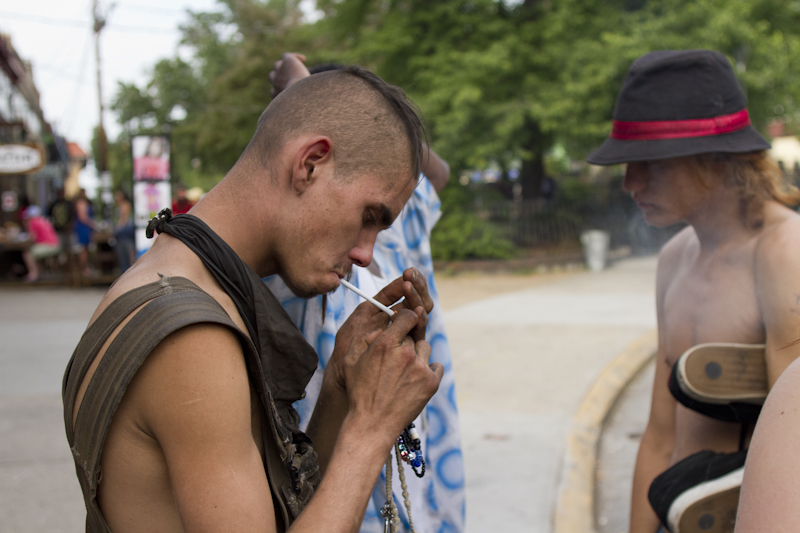
“You got any weed?” is how William “Trash” Hansen introduced himself on a hot spring day in the Little 5 Points neighborhood of Atlanta. The heels of his socks peeked through the disintegrated soles of his steel-toed boots as he walked the strip in search of the drug.
If you passed him on the street you may have thought twice before striking up a conversation. If the soot- drenched, patch- woven outfit didn’t give you pause, the blatant drug references and casual cat-calls may have.
Sporadically he’d push back the small puff of dreadlocked hair sprouting from the crown of his head or run his arm across his forehead to wipe away sweat. With each swipe a new abstraction of brake dust and grime clotted against his pale skin.
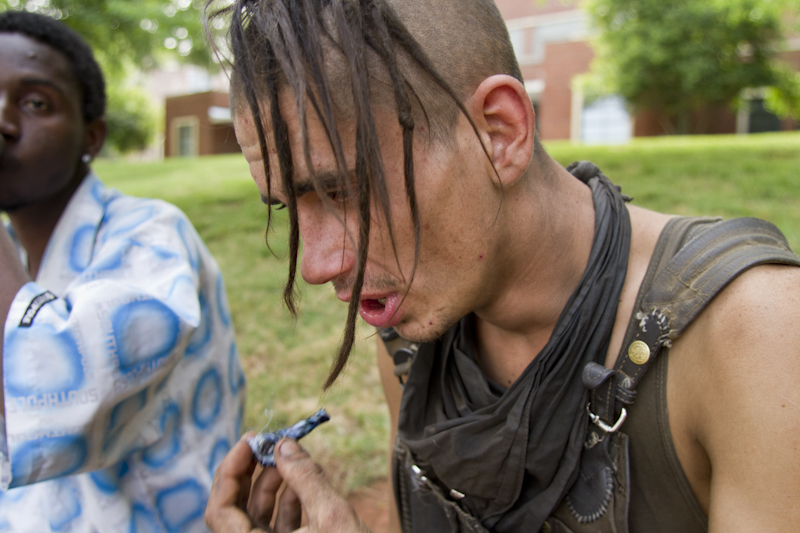
Drug and alcohol use is common within the hobo community. Trash (pictured) hits a marijuana pipe on the curb of a busy Atlanta street.
The dirt on his back came from across the United States. The FourLoko in his pocket, an alcoholic energy drink, came from a nearby convenience store.
At 20, Trash has endured, experienced and seen more of the United States than most will see in their entire lives. He has been riding freight trains around the country for nearly eight years.
Just like everyone, his story is unique, but his tales of foster care, abuse and ultimate freedom are a glimpse into a culture existing on the fringes of society, rarely seen by the general public. Trash and many others like him have no home, yet they call home the hundreds of thousands of miles of railroad that cross the country, the rail cars that bump along the tracks and the expansive yards of gravel and steel found in nearly every American city.
They are the modern vagabonds of today -- sometimes abused and abused by the system without anywhere else to go, sometimes there by choice – young, independent and free to ride the freight lines into their own uncertain futures.
It’s like Trash said after eight years on the rails, his hobo days weren’t anywhere close to coming to an end. Then again, it may be hard to figure where you’ll be in five years when you’re still not sure about your next meal.
“There are some good people… it just depends.”
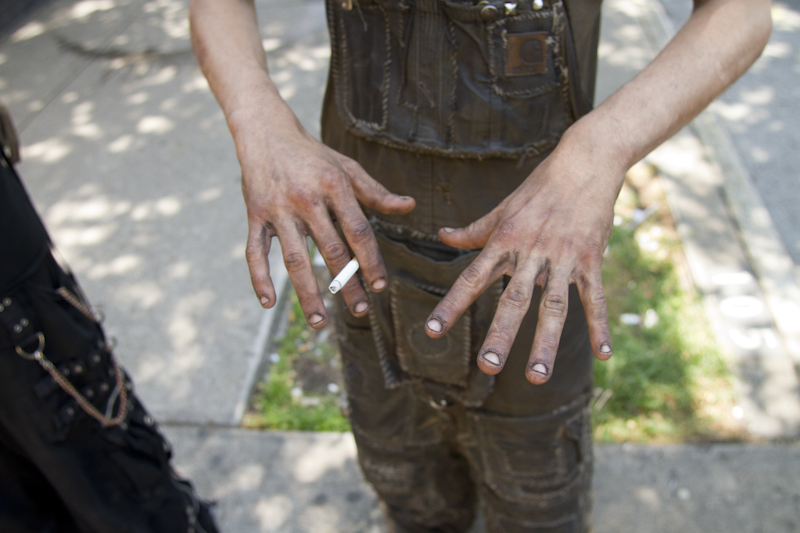
Grime and brake dust cling to freight cars and their passengers.
“When I hit the streets I was 12 years old,” he said. At 13 he hopped his first freight train.
Trash didn’t remember the day he entered foster care. He was young, maybe one or two years old.
At the age of 10, a couple adopted him near his birthplace of Seattle, Wash., He stayed with them until leaving for the streets two years later.
“[That was] two years of the most f*cked up sh*t ever,” he said, followed by a long pause. “I was afraid to walk down the hall to take a piss [when I was grounded], so I’d piss in my closet.”
When Trash was 11, he came in from playing in the yard with grass stains covering his new clothes. His adopted mother started screaming, forcing him to scrub the stains in the kitchen sink, but the streaks were there to stay. Then, without warning, she grabbed a mason jar of smoked salmon from atop the nearby washing machine and smashed it against Trash’s forehead.
“If I didn’t do something right the first time I got beat,” he said with a blank stare.
Eventually he only saw two options: stay in a group home or risk life on the street, eventually getting picked up and sent back to juvenile detention. Staying with his adopted family wasn’t an option.
Trash wasn’t the only foster youth faced with such a stark choice. An estimated 21 to 50 percent of homeless youth reported being placed in foster care or an institutional setting at some point, according to a 2007 report by the National Symposium on Homelessness Research.
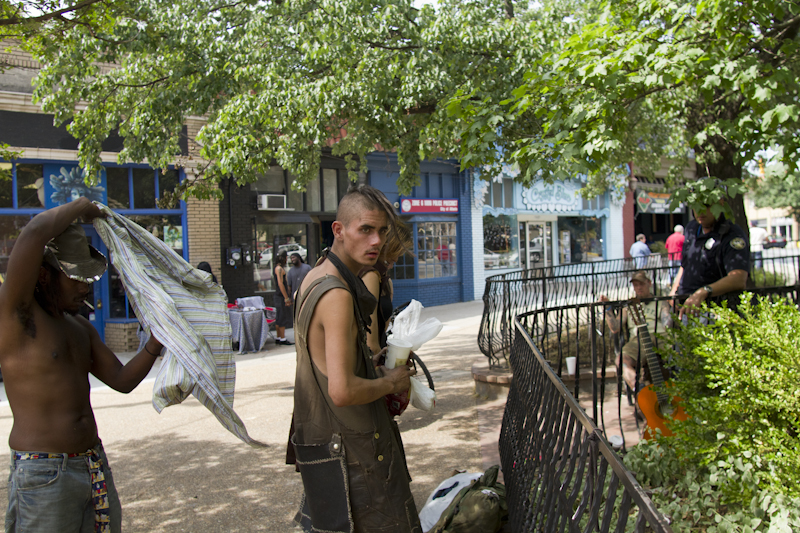
Trash (center) and acquaintances pick up trash and relocate under the watchful eye of Officer LaRosa (right). The local police precinct can be seen in the background.
“Group homes f*cking sucked,” Trash said. “Your home environment is just like your school environment. You don’t have parents, you have staff.”
“The whole idea about foster care is, it's a temporary arrangement while the state finds the kids a home,” said Amy Dworsky, Senior Researcher with Chapin Hall at the University of Chicago, adding that foster care and group homes weren’t designed to provide the same support system as a permanent family. “What often happens [before kids leave for the streets] is that young people end up with a couple of different foster families and the arrangements didn’t work out.”
Trash decided to take his chances on the streets. He spent about a year bouncing around Seattle before hopping his first freight train south. Trouble seemed to follow no matter where he went. He has seen the inside of a jail cell more times than he could count.
“I don’t want to ask the same people for change every day.”
While in town you could find him in the plaza at the heart of Little 5 Points.
“I’ll be here every day,” he said. “Just come find me.”
And that’s where he was with his pregnant dog Daisy and a cast of other homeless and nomadic characters only identifiable by their street names – “Trees,” “Twig,” “Torch,”“Karma” and so on.
After flying a sign in front of a nearby retail store Trash had enough money to make it through the day. It took him less than half an hour.
 He ordered a bowl of chicken alfredo from Pizza Hut, his favorite, and split it with his dog. He brought a round of breadsticks back to the plaza for the rest of the impromptu crew.
He ordered a bowl of chicken alfredo from Pizza Hut, his favorite, and split it with his dog. He brought a round of breadsticks back to the plaza for the rest of the impromptu crew.
“I live off of kindness and how can’t you be kind if you live off it, you know?” he said. “How can you not?”
Trees, Twig and their dog Stumps – fellow travelers – welcomed the breadstick breakfast with open arms and hungry bellies. They sat on the cool concrete sidewalk and ate, sharing with their canine companions. Every train rider sported a skank, even the dogs.
Daisy, Trash’s pitbull, was due to have puppies in a month or so. Trash planned to give the dogs to other train kids. Daisy was his best friend, he said, and the closest thing he had to family.
The woodland trio of Trees, Twig, and Stumps had been together for about four months.
Trees, 24, had “Thug Lice” scrawled across the bill of his hat and a train track tattooed on his right cheek. He rode the rails on and off for eight years, but has spent the last three months housed up with Twig’s relatives and friends around Georgia.

He said he was from California, but declined to give his full name. He pointed at two tear drop tattoos on his face and explained they were for two close friends who died on the rails, but he didn’t feel comfortable telling their stories.
Lisa “Twig” Hogan, 18, was raised in Arizona, but later moved to Atlanta with her mom. Before she met Trees she had planned to move back out west. A few months ago, while working at a shop in Little 5 Points, “this cute train kid walked in…” Insert Trees, Stumps and a change of plans.
Now known as Twig, Lisa spent many of her middle-school years in private school. Her mother still wasn’t comfortable with her traveling, much less riding freight trains. But Twig wasn’t a complete stranger to the tracks. She did “a two-month tour” with a friend a few years back, but never really learned the ropes.
Both traveled very different paths to reach their intersection in life, but shared a common need for freedom and a lust for travel.
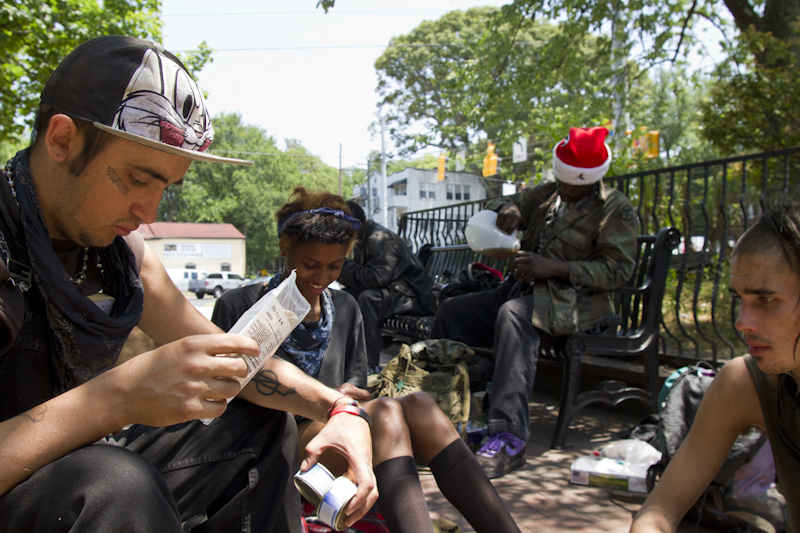
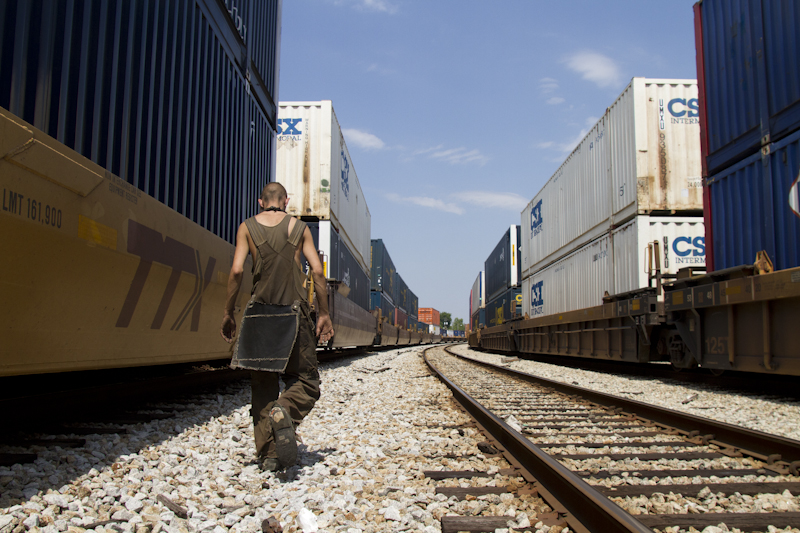
Dopers and theives.
trash was my boyfriend for a while. after this was made he went away for 4 months and when he came back i was living out there in little 5. we met when i helped him patch his clothes. we took care of each other for a while, ive never had someone look out for me like that, he is one of the nicest guys ive ever met. we didnt have much but we had each other and that was enough. and by the way we never once stole anything, i dont know where you got “thief,” man. i wish i knew where he was now, trash if you read this know that i really loved you and the 1st night i left you i was raped. later, when i went to stay with those tweakers cuz it was cold, i was help captive and treated like shit. trash never laid a hand on me but i made some stupid choices when i separated myself from him. i wish id never left and i wish he had been there when i came back. im rarely in little 5 points now, without trash i fear for my life. some fucked up shit happens in that place. peace.
DUDE I KNOW THAT GUY, I WALK THOSE STREETS ALL THE TIME. This is crazy!
Lifestyle is often not a free choice but simply a choice between equally bad alternatives. It is very difficult to choose a better lifestyle if you have never been exposed to it, have never known how if felt and never had the opportunity to appreciate it’s qualities.
They are trapped in a world of bad choices by fear, mistrust and ignorance and that is in both directions.
Freedom of the rails is the only freedom from suffering they have ever really experienced in durable measure, it was there from one day to another, rather than the odd fleeting glimpses of happiness and safety.
It would appear that group homes and foster care are really only preferable to properly managed and carefully regulated orphanages because of cost.
Article is the beginnings of ‘conditioning’ propaganda, along with the trust to legitimize self-medication with marijuana, by a government that has failed to provide gainful employment, decent education, reasonable opportunity, for its people. U.S.A. they shouted, U.S.A. Hearts filled with Patriotism, Hope, for more than the Capitalists that run this corpocracy are willing to pay for.
This lifestyle is one of hardships, the cost of living outside of society is fraught with being persecuted relentlessly by law enforcement just for existing sometimes, the constant presence of predators looking for a weak or desperate victim, being “invisible” to the rest of the world, and the risk of not making on thtrain one time and being maimed or killed for a momentary slip-up. It’s a hard life, but it’s worth it those times when you’re riding a freight car thru the country-side, free as a bird, only trusted friends with you, on the way to wherever, destination not really important. I miss that feeling sometimes.